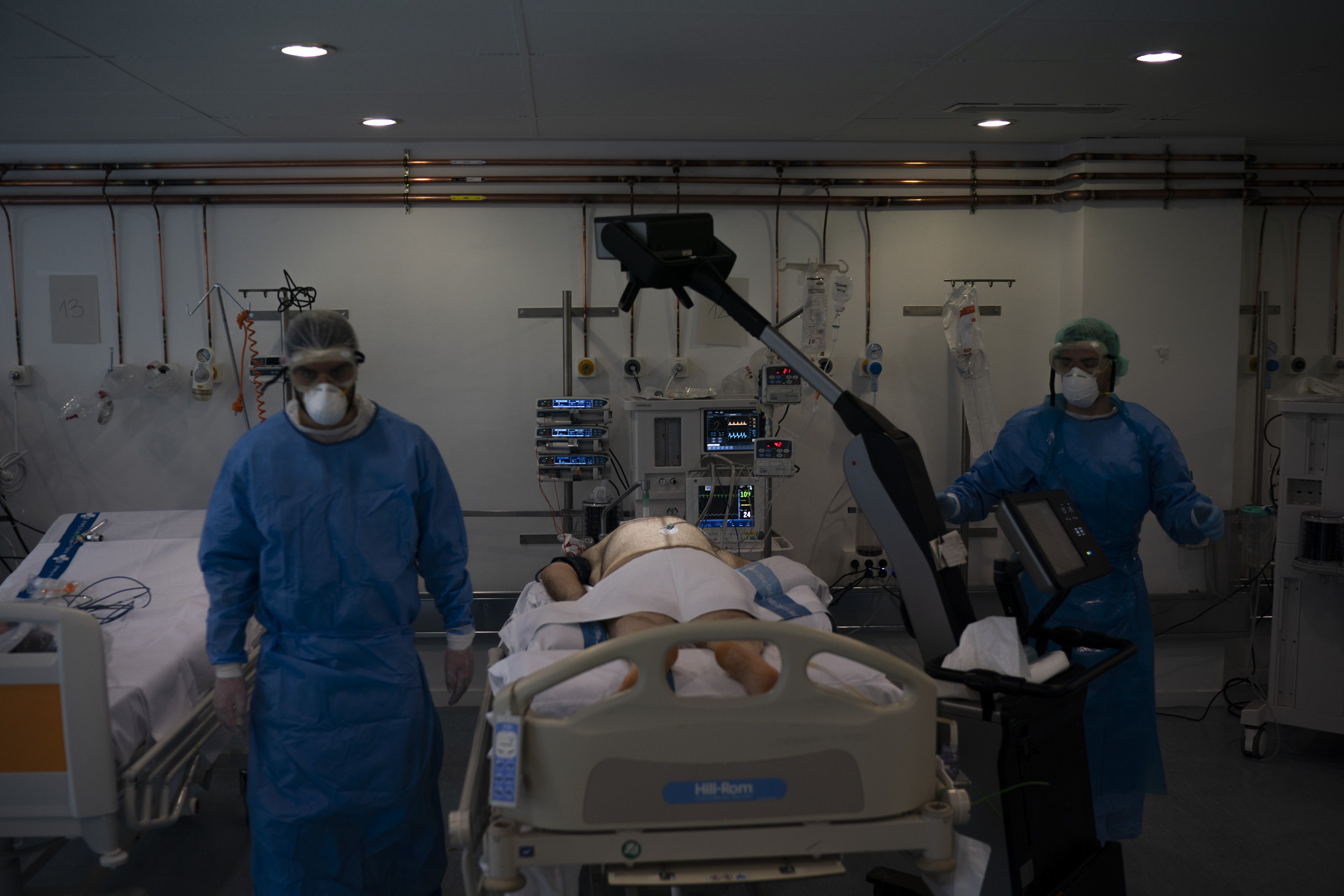
Corporal Mathias Jahn, member of the German armed forces Bundeswehr, fixes his glasses beside a mobile coronavirus test station, Gera, Germany, April 1, 2020. /AP
Corporal Mathias Jahn, member of the German armed forces Bundeswehr, fixes his glasses beside a mobile coronavirus test station, Gera, Germany, April 1, 2020. /AP
Editor's note: Edoardo Monaco is an associate professor and program director of the Globalisation and Development (GAD) Programme of the Hong Kong Baptist University and Beijing Normal University's United International College. The article reflects the author's opinions, and not necessarily the views of CGTN.
The COVID-19 crisis is a truly extraordinary circumstance. Not completely unprecedented, as pandemics aren't an absolute novelty. Not entirely unpredicted either, as warnings from the scientific community about viral and bacterial threats had been recurring over the past few years. But definitely extraordinary, and extremely challenging.
I confess that at times, as an Italian national who normally resides in China but is now caught in a web of travel bans and restrictions keeping him in the Philippines, I did feel personally "hit hard" on all sides.
But the truth is that my experience is hardly unique as millions are affected to a similar, or far larger, extent. Victims, their families, people on the front lines have had to pay an immense toll to this scourge. Administrators are burdened with the daily responsibility of life-or-death decisions they probably never expected to face – and thus, in some cases, were never trained to. As a professor whose university was swift in moving its whole course online, I can fulfill my employment via internet, but many jobs requiring actual physical presence are now in danger, so large sections of the population – especially in developing countries – are seeing their very livelihood threatened too, besides their health.
Therefore, clearly, I should not indulge in feeling sorry for myself. But how to ignore this overwhelming sense of "collective fragility"? After all, didn't this pandemic brutally remind us all of our fundamental vulnerability? I, for one, believe this is not a feeling we should fight or deny, but embrace, as individuals, and even more so as a society and as a species.
This powerful, common sense of fragility can, in fact, unite, and thus strengthen us in the process. While myopic views will insist in branding the problem as "someone else's" (some Western "leader" even assigned the COVID-19 virus a particular nationality) and will thus suggest isolationism as a fix, it is precisely in these circumstances that we should pull together, in solidarity, to embrace our common condition and work together for a better future. What unites us is truly far, far more than what separates us. Individualism and isolationism are false idols that simply do not deliver, in the long term. The greatest achievements in this crisis have been produced by concerted efforts of communities coming together – not physically, but in spirit – and responding as one, under consistent guidance, with collective discipline and profound dedication to the common good.

Healthcare workers prepare to conduct x-ray of a COVID-19 patient at a library that was turned into an ICU at Germans Trias i Pujol Hospital in Badalona, Barcelona, Spain, April 1, 2020. /AP
Healthcare workers prepare to conduct x-ray of a COVID-19 patient at a library that was turned into an ICU at Germans Trias i Pujol Hospital in Badalona, Barcelona, Spain, April 1, 2020. /AP
Fragility can remind us of our place in the universe, and of our limitations. We – again, as a species – are not masters of the cosmos, or omnipotent beings who have the right and the ability to control nature, but mere components of a holistic universal order whose balance is complex and, indeed, fragile. We have been consistently pushing the boundaries between wild and human, urban and rural, profit and risk. But nature still powers every fiber of our being, every cell in our bodies, and even the minuscule entities that now seem to threaten our way of life. This crisis is a stark, humbling reminder of the respect such fundamental life mechanisms command.
Fragility can also teach us to share responsibilities. We are realizing, in fact, the real depth and scope of modern, multidimensional challenges requiring a profound sense of global citizenship, international engagement, servant leadership, and thus the overcoming of "own backyard" perspectives.
Global governance actors capable of managing such challenges are in desperate need, but they can only emerge from a grassroots expansion of horizons and perspectives, from a redefinition of progress as a holistic, sustainable pursuit, and even, possibly, from the actual pooling of national (and personal) prerogatives for the common good. In this regard, regional platforms are an essential block to build global governance upon, yet even the EU – the regional supra-governmental organization of reference in this sense, product of an integration process historically capable of patching together a conflict-torn continent by means of stability and prosperity – is failing its citizens, with its very inability to think and act as a union.
This is the time when we are called to come to terms with the boundaries of both our prowess, and our fragility, to learn from this experience and from each other, united, for the greater good, in view of other similar challenges to come. Let us not succumb to fear and exclusion: solutions are well within the reach, and the potential, of a global, diverse, interacting community. The alter ego of challenge is, always, opportunity.
(If you want to contribute and have specific expertise, please contact us at opinions@cgtn.com.)